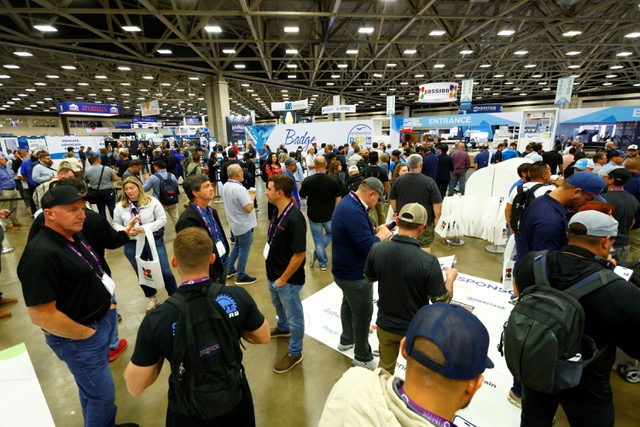Varied Interpretations
The industry fights to be deemed as essential across the nation


Disclaimer: The information provided in this article is up to date at the time of publishing, but circumstances are changing rapidly. Check with local governments, municipalities and the PHTA website for the most current information. Access the PHTA Coronavirus Toolkit.
Households nationwide have settled into routines of confinement to four walls, working from home, crisis schooling, increased home-cooked meals and more time together due to the coronavirus pandemic.
Pool companies across the nation, however, see a different day-to-day. While most states and municipalities have deemed pool companies as essential during shelter-at-home mandates, there are exceptions where pool pros and industry associations are fighting for relevance.
In the Beginning
When Florida counties started issuing shelter-at-home mandates in mid-March, Rudy Stankowitz, owner of Aquatic Facility Training and Consultants, LLC, in Gainesville, Florida, received word that Alachua County’s live broadcast said swimming pool service would likely be removed from the essential services listed on the county mandate. Stankowitz contacted the county commissioner’s office, exchanging texts with the commissioner directly. He then reached out to Florida Swimming Pool Association president David Pruette for assistance.
Pruette and the FSPA got involved. After multiple discussions, it was determined that each individual pool company that filed an appeal with the county commissioner’s office would be approved to do business despite the mandate listing pool service as nonessential.
“It was a surprise to us all,” Pruette says. “But we thought [the commissioner’s office was] very cooperative. It all happened in a 12-hour period. We were surprised when they did it company by company. They were approving [appeals] as they were filled out, almost like an application to be an exception.”
Within a week, thankfully, the governor’s office deemed pool service essential statewide, but it was clear that even local competing companies were willing to rally together to help the industry as a whole.
Recent Wins
Wisconsin put an emergency order into effect March 24 and when Safer at Home FAQs were released by the Wisconsin governor’s office, pool cleaning service was listed as nonessential with no exceptions. It’s something Dan Lenz, president of the Midwest Chapter of PHTA, was already aware of — he, the board of directors and many across pool pros across the state started reaching out to legislators in Wisconsin since the Cybersecurity & Infrastructure Security Agency’s Memorandum on Identification of Essential Critical Infrastructure Workers was released March 19.
The Midwest Chapter of PHTA, with the assistance of Steven Getzoff, outside general counsel for the PHTA, sent a thoroughly researched email March 26 to the governor, Wisconsin Department of Health and a number of Wisconsin officials. The email listed some of the essential tasks pool companies perform in the community, citing the World Health Organization’s water maintenance criteria, the CISA Memorandum (which included service providers that are “necessary to maintaining the safety, sanitation and essential operation of residences”) and a variety of other nationally recognized resources.
On April 10, the chief legal officer for the Wisconsin Economic Development Corporation, Jennifer Campbell, sent an email to the Midwest Chapter of PHTA and several others involved in the efforts to overturn the ‘nonessential’ designation. “From our perspective, as well as a few local authorities we’ve spoken to in Wisconsin, [the email] allowed us to resume retail operations, pool maintenance and to finish open construction projects,” Lenz says.
Along the way, board members had conversations with local law enforcement, as both sides were trying to figure out how to proceed. “The email from Ms. Campbell helped us to provide that clarity to law enforcement,” Lenz says. “It’s very likely that their seeking clarification, in addition to our identifying the needs for our industry to be essential somehow combined at the governor’s office to get us where we are now.”
With the help of Jennifer Hatfield, director of government affairs for PHTA, and additional PHTA staff, Lenz and others requested that the official documents be updated to match Campbell’s information. As of April 16, updates were made to all Wisconsin government documentation, allowing pool companies in Wisconsin to operate as essential, as long as social distancing practices are strictly maintained.
“The [Wisconsin] pool industry is on a much more solid foundation,” Lenz says of the victory.
Still in the Works
When the state of emergency was enacted for Michigan, the Backyard Pool and Spa Professionals — the Michigan chapter of the PHTA — met virtually to discuss strategy. Chris Ferriss, chairman of education and treasurer for the chapter and owner of Splash Pool Services in Wayne, Michigan, says that the meeting covered specific questions:
- How do we contribute as a group of individual companies in a responsible manner and civically participate in what many industries were asked to do?
- How do we protect our neighbors and fellow Michiganders by accepting the practices of social distancing in our business and with our employees?
- How do we show consideration in the manner we conduct ourselves, as professionals?
- How do we minimize the direct fiscal affect that this will have from a delayed season?
Unfortunately, when the Michigan shelter-at-home mandate was put in place March 23, there was little room for a season to begin at all. Though the wording was similar to that of other states (“workers may also undertake projects that are necessary to maintain the safety, sanitation and essential operations of a residence during the emergency, including projects immediately necessary to restore the habitability of a residence”), the interpretation was anything but.
Ferriss says that, with the help of the PHTA and the chapter’s board of directors, a case was presented to the state government providing the industry’s interpretation of this order to mean pool companies are essential services under CISA standards, and requesting that clarification be provided in government documents by specifically adding pool and spa service and maintenance as essential.
“The concerns and fears of the many industry members were evident as [members] reached out to us,” Ferriss says. “In spite of our interpretation and message that at least the maintenance part of our industry and chemical distribution be classified as essential services, we were disappointed that the only thing [the governor] added was that pool and spa stores were not allowed to be open. No one expected new construction of projects to be allowed, nor did we think it prudent, but this lack of consideration for the public health risk was stunning. Virtually stopping the chemical distribution and service capability for proper filtration, we felt, would cause a conducive environment for public health and safety risk.”
This concern stretched beyond the pool industry as approximately 15,000 protesters from several industries — including lawn care, landscapers and pool pros — participated in Operation Gridlock at the Michigan state capitol April 15. Commercial and private vehicles, many covered in protest signs, jammed Capitol Avenue and surrounded streets for more than a mile in several directions in an effort to protest the limiting aspects the shelter-at-home order placed on businesses. Governor Whitmer said in reports that the irony of the protest against the order is that it may have created the need to lengthen it.
But Ferriss says that clarifications still need to be made. “The order is so nuanced and inconsistent,” he says. “You can’t buy paint at Home Depot, but you can at True Value. You can go out in a boat on the lake, but you can’t put a motor on that boat.” Ferriss knows at least four sheriffs in the state that have announced they will not enforce the stay-at-home order restrictions. “There’s a breaking of the ranks, so to speak,” he says, “of the municipalities and local communities against [the state mandate], but I don’t know how meaningful it is.”
In the meantime, the PHTA submitted a letter to Michigan House leaders which is under review. Ferriss is personal friends with a local mayor who is talking to the governor’s office on the pool industry’s behalf as well.
“[Our local pool industry] had just come through two difficult seasons with weather related impacts, and labor limitations and availability,” Ferriss says. “This was to be a season of finally getting ‘over the hump’ and reestablishing a more secure foundation of long-term business viability. This is taking two months out of an only six- to seven-month seasonal business. We do not feel it is deliberate on [the governor’s] part, but her lack of knowledge will have the same result as a deliberate action.”
The Good Fight
Advocating for the industry also continues elsewhere. While maintenance of swimming pools and hot tubs is allowed in Pennsylvania, Hatfield says that she is working with the Northeast Pool & Spa Association to advocate for the government to also qualify pool stores and pool construction as essential.
On April 13, PHTA and NESPA distributed a call-to-action to Pennsylvania members to urge their legislators’ support of HB 2400, which provides a waiver on the Business Closure Order to all public and private construction activities. A joint letter of support was sent to the House Speaker and other House leaders, urging action on HB 2400. PHTA also reached out to one of the bill sponsors to advise her of PHTA’s support of this measure. Additional measures are also in the works regarding other state bills.
As the pandemic changes and progresses, so do state mandated orders. A more recent revision to listed essential businesses in New York caused the PHTA and NESPA to take action there as well. The organizations were able to obtain clarification April 16 that implies pool openings and maintenance are still essential services within the state.
“As temperatures increase, public health and safety hazards will emerge if pools and hot tubs are not maintained,” Hatfield says. “Stagnant water can develop in the pool and on top of pool covers that have been closed for the winter. This can lead to waterborne and mosquito borne illnesses. Further, many of these covers may not qualify as safety covers. Drowning remains a leading cause of accidental injury death in the U.S. It is critical that standing water be removed from pool covers and necessary repairs, cleaning and maintenance be performed. And who knows how long we’re going to be stuck in this situation. Giving families a safe and healthy haven in their backyard to enjoy is important too.”
As the nation continues to navigate the changes brought on by the coronavirus, Hatfield recommends that pool professionals stay apprised of local and state mandates on a regular basis, since they can change quickly. There may also be pockets within states in which local municipalities are restricting the industry more. That’s why the PHTA put together a position statement, available on the PHTA COVID-19 update webpage, to help in these circumstances.
However, the PHTA should not be the only source of information, especially when there may be misinterpretations at local levels. Obtaining clarification from local municipalities is also important. “Our chart and the information we provide on the website is how [the PHTA is] interpreting the executive orders,” Hatfield warns. “That doesn’t mean that there aren’t going to be people who may misinterpret it or think differently.”
Despite the smattering of hiccups around the nation, Hatfield remains positive. “As an industry, we have fared well, when looking at the big picture of the entire United States,” she says. “We are mostly found to be essential services, be it retail stores, manufacturing, pool service or construction.”






